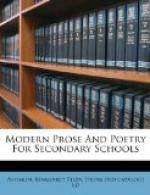=A Walk in the Winter Woods=:—Tell of a real or imaginary stroll in the woods when the snow is on the ground. If possible, plan the theme some time before you write, and obtain your material through actual and recent observation. In everything you say, be careful and accurate. You might speak first of the time of day at which your walk was taken; the weather; the condition of the snow. Speak of the trees: the kinds; how they looked. Were any of the trees weighted with snow? Describe the bushes, and the berries and grasses; use color words, if possible, as Mr. Sharp does. What sounds did you hear in the woods? Did you see any tracks of animals? If so, tell about these tracks, and show what they indicated. Describe the animals that you saw, and tell what they were doing. What did you gather regarding the way in which the animals live in winter? Speak in the same way of the birds. Re-read what Mr. Sharp says about the birds he saw, and try to make your own account clear and full of action. Did you see any signs of human inhabitants or visitors? If so, tell about them. Did you find anything to eat in the woods? Speak briefly of your return home. Had the weather changed since your entering the woods? Was there any alteration in the landscape? How did you feel after your walk?
=The Winter Birds=:—For several days before writing this theme, prepare material for it by observation and reading. Watch the birds, and see what they are doing and how they live. Use a field glass if you can get one, and take careful notes on what you see. Make especial use of any interesting incidents that come under your observation.
When you write, take up each kind of bird separately, and tell what you have found out about its winter life: how it looks; where you have seen it; what it was doing. Speak also of its food and shelter; the perils it endures; its intelligence; anecdotes about it. Make your theme simple and lively, as if you were talking to some one about the birds. Try to use good color words and sound words, and expressions that give a vivid idea of the activities and behavior of the birds.
When you have finished, lay the theme aside for a time; then read it again and see how you can touch it up to make it clearer and more straightforward.
=Christmas at our House=:—Write as if you were telling of some particular occasion, although you may perhaps be combining the events of several Christmas days. Tell of the preparations for Christmas: the planning; the cooking; the whispering of secrets. Make as much use of conversation as possible, and do not hesitate to use even very small details and little anecdotes. Perhaps you will wish to tell of the hanging of the stockings on Christmas Eve; if there are children in the family, tell what they did and said. Write as vividly as possible of Christmas morning, and the finding of the gifts; try to bring out the confusion and the happiness of opening




